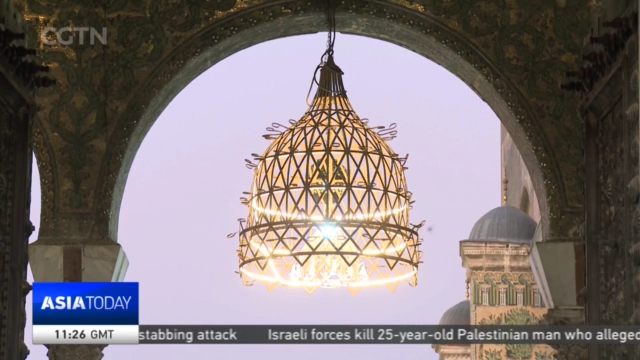
19:51, 11-Aug-2019
Eid al-Adha in Syria: War and sanctions dampen festival celebrations
Updated
20:15, 11-Aug-2019

Eid al-Adha is one of the most important festivals for Muslims. But in Syria the ongoing conflict and crushing sanctions imposed by Europe and North America mean that many people cannot afford their usual celebrations. Our reporter Alaa Ebrahim reports from Damascus.
This is what the high season for sheep and goats looks like in Damascus nowadays. Buying goat and sheep for the Feast of Sacrifice has always been a major part of Eid al-Adha celebrations, the longest religious holiday for Muslims. But this year the mood is less than festive even for livestock dealers who usually look forward to this time of the year.
NAZIR EDRISS LIVESTOCK DEALER "This is usually the time when every Muslim buys a sheep or goat to sacrifice but now not many can afford it, sheep is expensive because everything else is."
MALEK AL-DOKES LIVESTOCK DEALER "The prices are higher than last year, but we try to keep the tradition."
Across town in bustling Hamidiya market, it's not much better. Shops struggle to stay open as people limit their shopping to essentials.
IMAN DAMASCUS RESIDENT "I don't think I will buy anything, maybe just a sweater for my son. Before we used to buy a whole new outfit for each child but now who can afford it?"
HASNA DAMASCUS RESIDENT "In previous years, even as rockets rained down on the city, you would see more people going out to shop. But now look at those who are browsing, they rarely buy anything. This is a very bad year economically for us."
As night falls on the capital and the center of its old city, the Grand Umayyad mosque lights up preparing for the main event.
ALAA EBRAHIM DAMASCUS "It's been a little over a year since the fighting around Damascus ended with the last rebels either surrendering or moving to Idlib in the northwest part of the country. But the promised prosperity was not brought about. Crippling economic sanctions and the on-going fighting in other parts of the country, and damaged infrastructure have all put a greater strain on the already stretched people."
Distributing sacrificial meat and putting on lavish feasts are not the only traditions of Eid al-Adha. Buying Syrian sweets is another must for the holiday. Al-Midan souk is the place to get sugary pistachio delicacies. And like her grandmother and mother before here, Om Ahmad would like to keep the tradition alive. But the stay-at-home mom is coming to terms with the fact that these are more difficult times.
OM AHMAD DAMASCUS RESIDENT "In years before during the war, we couldn't afford sweets made with pistachio or pecan all the time so we went for the cheaper date-based sweets. But even this is too expensive this year so we might skip it. This could be the first time we can't put out desserts for visitors."
And while Om Ahmad goes on in her quest to find affordable sweets, vendors try to sell their goods-- a task that's proving more difficult. Alaa Ebrahim, CGTN, Damascus.
SITEMAP
Copyright © 2018 CGTN. Beijing ICP prepared NO.16065310-3
Copyright © 2018 CGTN. Beijing ICP prepared NO.16065310-3